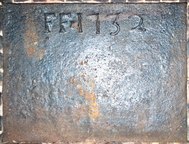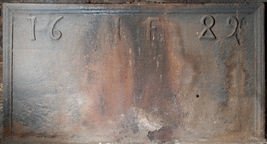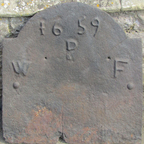-
1223
Description: Rectangular; no edging; top centre, inscription, FF, and date, 1732, separated by a small saltire.
Notes: The possibility exists that the initials are those of Francis Fairburn, whose descendants are known to have occupied the house where it lies.
Inscription: FFx1732
- Decoration tags:
- rectangular (shape)
- none (edging)
- individual letters
- individual numbers
- text
Manufactured: in 1732 possibly in the Weald area of England.
Current location: in private hands, West Peckham, Kent, England.
- Attached to series:
- Date & initials firebacks
-
879
Description: Rectangular; ogee-moulded edging (top and sides); at top, initials in middle, date split between top corners; large letters; straight base to number '8'.
Notes: The '8' is more typically found with the straight edge at the top.
Inscription: 16 IF 89
- Decoration tags:
- rectangular (shape)
- cyma reversa/ogee (edging)
- carved stamps
- individual letters
- individual numbers
- text
Manufactured: in 1689 in the Weald area of England.
Current location: in private hands, Westfield, East Sussex, England.
- Attached to series:
- Date & initials firebacks
-
1129
Description: Arched rectangular shape; no edging; date in arch; initials in wide triad below.
Notes: A rather crudely cast fireback; rivets indicate repair. Wotton Auctions, Wotton-under-Edge, 30 Apr-1 May 2019, lot 1138.
Inscription: 16 59 / W R [or P] F [triad]
- Decoration tags:
- rectangular with round arch (shape)
- none (edging)
- carved stamps
- individual letters
- individual numbers
- text
Manufactured: in 1659 in England.
Current location: not known.
- Attached to series:
- Date & initials firebacks


